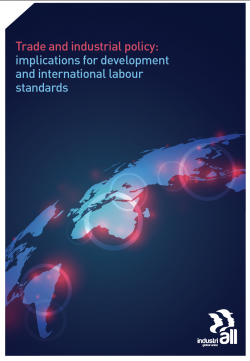12 January, 2021As part of implementing the action plan on trade adopted at the Executive Committee meeting in Mexico, November 2018, IndustriALL is publishing a study, capturing the interplay between trade and industrial policies and its implications for the development and labour standards.
 |
| ENG |
Attempts to protect and promote labour standards through trade agreements have not yielded desired results, due to a lack of enforceable provisions, absence of institutional mechanisms and political will.
The study, funded by Friedrich Ebert Stiftung, aims to raise awareness, help build solidarity among trade unions and take actions to resist the corporate trade agenda, promote an inclusive and sustainable industrialization process and influence policy outcomes to defend workers interests.
Focusing on Africa, Latin America, Asia-Pacific and the Middle East Asia, the study highlights binding commitments undertaken particularly through a new generation of trade and investment agreements that have significantly limited governments’ abilities to use industrial policy tools.
The study shows the need to protect policy space; renegotiating, termination of harmful agreements and being vigilant of ongoing negotiations are key to regain lost policy space and not to concede new grounds.
“Over the years, international trade policies have been captured by the interests of multinational companies, leaving little space for sovereign industrial policies, especially in developing countries. Trade can be a strong factor for development, as long as it promotes social dialogue, links social and economic upgrading, generates and distributes wealth, revitalizes multilateralism and promotes Just Transition towards decent work and sustainable livelihoods. That’s why full transparency in negotiations is crucial, while trade unions demand to take part in decision-making processes, as pointed out in IndutriALL’s action plan on trade and industrial policy.”
